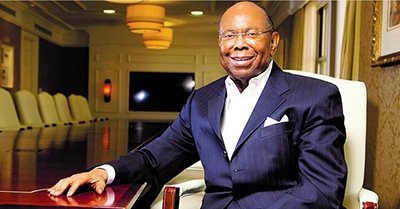(Source By Special to the AFRO):
Jeremy Allen, Executive Editor, Michigan Chronicle
Dr. William “Bill” Pickard – entrepreneur, philanthropist, education advocate, business titan, mentor, and visionary – passed away peacefully Wednesday, June 12, at his West Palm Beach, Fla. home, surrounded by family and loved ones.
Dr. Pickard’s daughter, Mary Pickard, issued the following statement: “On behalf of the Pickard family, we extend our heartfelt gratitude for the love and support during this difficult time. Your kindness has provided immense comfort. We are deeply touched by the memories shared, which highlight the impact my dad had on so many lives. Thank you for standing by us as we navigate our grief. We kindly ask for privacy to allow our family to heal. Funeral arrangements will be announced soon.”
Born in the modest confines of Georgia, Dr. Pickard’s early life was steeped in the values of hard work and education. His family’s migration to Flint, Michigan, was a pivotal moment that set the stage for his future successes. It was in Flint that Dr. Pickard began to forge his path, starting with an associate’s degree from Mott College in 1962. His academic journey did not stop there; he earned a degree in sociology from Western Michigan University in 1964, followed by a master’s degree in social work from the University of Michigan in 1965, and ultimately a Ph.D. from Ohio State University.
Sign up for our Daily eBlast to get coverage on Black communities from the media company who has been doing it right for over 130 years.
Dr. Pickard’s entrepreneurial spirit was ignited in 1971 when he purchased his first McDonald’s franchise in Detroit. This initial venture was the cornerstone of a business empire that would span several industries and impact communities across North America. By 1989, Dr. Pickard founded the Global Automotive Alliance (GAA) Manufacturing, a holding company that generated over $5 billion in sales through its network of automotive parts manufacturers. His ability to navigate and succeed in the competitive world of business was unparalleled, making him one of the most influential Black businessmen in the nation.
However, Dr. Pickard’s legacy extends far beyond his business achievements. His commitment to philanthropy and community service was equally remarkable. A proud member of Alpha Phi Alpha Fraternity, Inc., Dr. Pickard was deeply invested in the upliftment of the Black community. His contributions to education were vast and impactful, highlighted by his more than $3 million donations to his alma mater, Western Michigan University, resulting in the construction of new campus facilities named in his honor. Additionally, he donated more than $2 million to Morehouse College to support Black male students from Detroit, Flint, and his birthplace, La Grange, Georgia.
Pickard, who co-owns Real Times Media and Michigan Chronicle, has generated more than $5 billion dollars in sales through GAA, with eight plants in the U.S. and Canada, servicing Boeing, Mercedes Benz, Ford, General Motors, Delphi, Johnson Controls, Starbucks, The Home Depot and Merck & Co. Pharmaceuticals. Black Enterprise honored Dr. Pickard as one of the 50 most Influential Black Entrepreneurs over the past 50 years.
Beyond that, Dr. Pickard has served on numerous business and non-profit boards including Asset Acceptance Capital Corporation, Michigan National Bank, LaSalle Bank, Business Leaders for Michigan, National Urban League, Detroit Symphony Orchestra, Detroit Black Chamber of Commerce, the Board of Directors of the National Park Foundation, and is a lifetime member of Alpha Phi Alpha Fraternity.
In 2019, Michigan Governor Gretchen Whitmer awarded Dr. Pickard “The Michigan Lifetime Humanitarian Award,” and he was awarded “Michiganian of the Year” for his exemplary business success, civic leadership, and philanthropy.
He was the first Chairman of the African Development Foundation in 1982, appointed by President Ronald Reagan, and under President George H.W. Bush, he was appointed to The National Advisory Committee on Trade Policy Negotiations (1990) and the Federal Home Loan Bank Board – Indianapolis Bank of Indiana (1991). In February 2021, he was appointed by the Commonwealth of the Bahamas as the first-ever honorary consul for the State of Michigan.
“The world has lost a true visionary and trailblazer with the passing of Dr. William F. Pickard. He was not only my esteemed business partner and colleague, but a dear friend whose wisdom, guidance, and unwavering belief in me changed the course of my life,” said Hiram E. Jackson, Publisher of Michigan Chronicle and CEO of Real Times Media.
“Dr. Pickard’s pioneering spirit, coupled with his brilliant mind and generous heart, left an indelible mark on the business world and inspired countless others to dream big. His legacy of entrepreneurship, philanthropy, and uplifting the Black community will forever be etched in history. I am eternally grateful for the opportunity to have walked alongside this giant among men. While his physical presence may be gone, Dr. Pickard’s impact on me and so many others will reverberate for generations to come. Rest in eternal peace, my friend and mentor.”
Born on Jan. 28, 1941, Dr. Pickard notably said to the Clark Atlanta graduating class of 2017: “I’m from LaGrange, Georgia, a very small town, but I have a simple belief about life. Anybody from anywhere can accomplish anything. But you must put the work in.”
That was Dr. Pickard’s spirit. That’s what made him special.
Funeral arrangements will be forthcoming. The family has asked for privacy at this time but wants to thank the community for their prayers and support.
Senior Reporter Ebony JJ Curry contributed to this report. This article was originally published by the Michigan Chronicle

